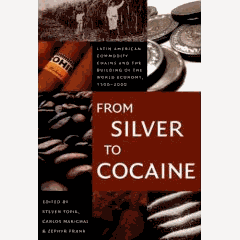 |
|
| |
|
| |
|
| |
|
| |
|
| |
||||||||||||||||||||||||||||||||||||||||||||||||||||||||||||||||
| |
|
|
|
|
From Silver to Cocaine
Contents Introduction
1. The Spanish-American Silver Peso: Export Commodity and Global Money of the Ancien Regime, 1550-1800 (p. 25)
2. Indigo Commodity Chains in the Spanish and British Empires, 1566-1860 (p. 53)
3. Mexican Cochineal and the European Demand for American Dyes, 1550-1850 (p. 76)
4. Colonial Tobacco: Key Commodity of the Spanish Empire, 1550-1800 (p. 93)
5. The Latin American Coffee Commodity Chain: Brazil and Costa Rica (p. 118)
6. Trade Regimes and the International Sugar Market, 1850-1980: Protectionism, Subsidies, and Regulation (p. 147)
7. The Local and the Global: Internal and External Factors in the Development of Bahia’s Cacao Sector (p. 174)
8. Banana Boats and Baby Fod: The Banana un U.S. History (p. 204)
9. The Fertilizer Commodity Chains: Guano and Nitrate, 1840-1930 (p. 228)
10. Brazil in the International Rubber Trade, 1870-1930 (p. 271)
11. Reports of Its Demise Are Not Exaggerated: The Life and Times of Yucatecan Henequen (p. 300)
12. Cocaine in Chains: The Rise and Demise of a Global Commodity, 1860-1950 (p. 321)
Conclusion
Contributors (p. 361) Index (p. 365) ***** "From Silver to Cocaine is an ambitious and novel application of the ‘commodity chain’ approach to the insertion of a whole continent into the world economy. It has no rivals".
"From Silver to Cocaine is an important and innovative collection. It provides a corrective to the purely national studies of commodities and of export sectors, and to studies that posit influence in only one direction, focusing on the international penetration of capital and trade into Latin America. This book makes a strong statement about the direction of future research: it should be required reading for anyone interested in the economic history of Latin America, broadly conceived".
|
|
|
|
|
|
||||||||||||||||||||||||||||||||||||||||||||||||||||||
| |
||||||||||||||||||||||||||||||||||||||||||||||||||||||||||||||||
| |
| |
